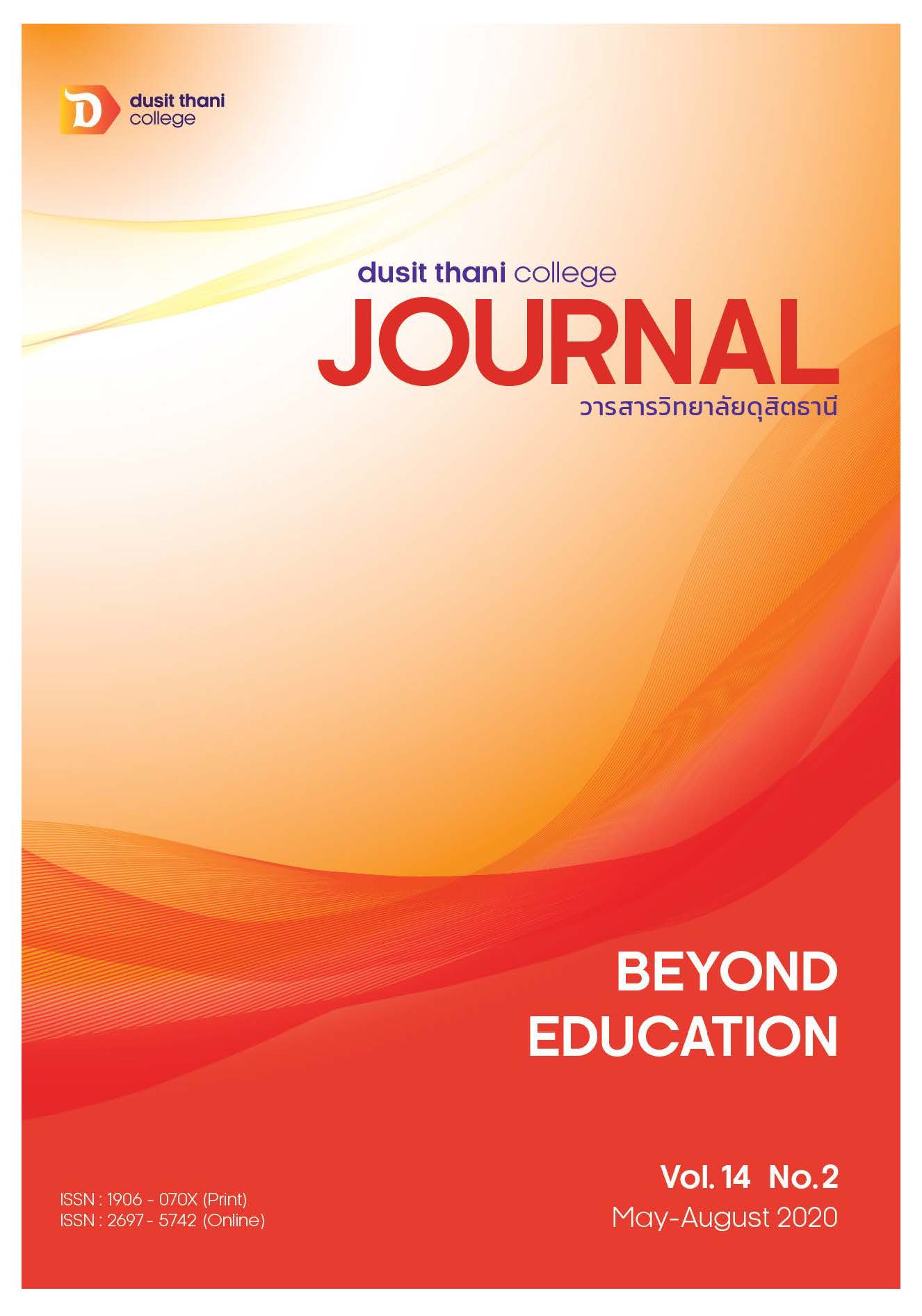Behaviors and Needs in Healthy Food Products of Consumer in Bangkok
Main Article Content
Abstract
The objectives of this research were (1) to study the consumer behavior of healthy food in Bangkok (2) to study the consumer needs of healthy food products in Bangkok. The data were collected by using the questionnaire survey with 414 consumer who live in Bangkok. The statistics used in analyzing the data were Frequency, Percentage, Mean, Standard Deviation, and One-way ANOVA.
It was found that 50.2% of the majority consumer were female, 56% were between 20 - 30 years old. 49.3% were students and 65.5% undergraduate degree or equivalent, 76.1% was single and 46.6% earned an average monthly income below 10,000 baht and 97.6% of consumer were healthy (1) the consumer behavior of healthy food were found that 45.4% of thought that there were food groups in healthy food. 62.3% of the cost per time when using service for a healthy food stores was 100 - 250 bath. 53.1% of were access health food stores by internet online. 57% of consumer were choose healthy food for a good health. 47.6% of consumer thought that healthy food will make the healthy body. 76.1% of consumer in healthy food consumption was a regular meal. 37.7% of healthy food consumption per week was mostly moderate (2 - 3 days/ week). (2) The overview of consumer need in healthy food products was a high level ( = 4.11), when considering each aspect, it was found that the highest demand was consumption usefulness ( = 4.59), followed by product quality ( = 4.58) and accessory ( = 4.50) respectively
The results of the hypothesis test were found that the consumer behavior in healthy food products were different from the consumer need in healthy food products as the attitude about healthy food.
Article Details
Article Screening Policy
- All research and academic articles to be published must be considered and screened by three peer reviews in the relevant field / article.
- All articles, texts, illustrations and tables published in the journal are the personal opinions of the authors. Editors don't always have to agree. And no responsibility whatsoever is the sole responsibility of the author.
- The articles to be published must never be published. Where did you first publish? And not in the consideration of other journals If the audit found that there has been a duplicate publication It is the sole responsibility of the author.
- Any article that the reader sees as being plagiarized or impersonated without reference. Or mislead the work of the author Please let the journal editor know it will be your greatest blessing.
References
Boonphon, W. (2010). Health Food Consumption Behaviors of Bangkok Metropolitan Residents. Thesis. Master of Arts program in Home Economics for Community Development, Ramkhamhaeng University.
Choketaworn, L. and Donkwa, K. (2017). Impacts of Marketing Mix and Attitude toward Clean Food Purchased Decision of Consumers in Nakhon Ratchasima Province. KKU Research Journal, 5(1), 79-91. (In Thai).
Chootom, N. (2016). Factors affecting buying decision for Clean food in Amata Nakorn Industrial Estate in Chonburi province. Thesis. Chonburi: Burapha University.
Chokratsamesiri, N. (2015). Marketing mix factors that are related to loyalty Consumer loyalty
In choosing affordable hotel services In Muang District, Nakhon Pathom Province. Thesis. Master of Business Administration, Graduate School, Silpakorn University.
Ministry of Public Health. (2019). Dietary Reference Intake for Thais 2020. Nonthaburi:
Bureau of Nutrition (BoN), Department of Health, Ministry of Public Health.
National Statistical Office. (2017). Demographic statistics in Bangkok Population Statistics-
Science, Bangkok. Searched on 2 December 2019.
Retrieved from http://statbbi.nso.go.th.
Navaratana Na Ayudhya, T. (2006). Services Marketing: Concepts and Strategies.
4th ed. Bangkok: Chulalongkorn University.
Phat, W. (2017). Factors that affect the decision to consume clean food of the population in
Bangkok. Independent study, Master of Business Administration,
Graduate School, Bangkok University.
Preecha, K. (2010). Demand theory. Searched on 15 December 2019,
Retrieved from https://www.gotoknow.org.
Phuengpadung, B. (2008). Self-Health Care Behavior: A Case Study of Bangkok Area.
Thesis, Master of Sociology and Anthropology. Faculty of Sociology and Anthropology:
Thammasat University.
Panoppsri, W. (2007). Behavior of Consuming Health food of People in Lumlukka District of
Pathumthani Province. Thesis, Master of Business Administration,
Phranakhon Rajabhat University.
Rugmai, S. (2010). Documentation for research methods. MBA 482. Bangkok: Dusit Thani College.
Schlenker, E. and Gilbert, J. N. (2018). Williams' Essentials of Nutrition & Diet Therapy.
12th ed. The United States: Mosby
Smittikai, C. (2011). Consumer Behavior. Bangkok: Chulalongkorn University.
Sukhvibul, T. (2009). Considerations in the creation of estimation type tools (Rating-Scale). Searched on 12 December 2019. Retrieved from http://www.ms.src.ku.ac.th
Tiwsangvarn, S., Chantrapornchai, W. and Suwonsichon, T. (2011). Consumer Needs and Factors Affecting Consumer Buying Decision of Thai Male for Functional Drink. Proceedings of 49th Kasetsart University Annual Conference: Agro-Industry, Bangkok.
Thawee-Phon, S. (2007). People 's satisfaction with providing counseling services Special
Problems. Thesis, Master of Public Administration General Administration,
College of Public Administration, Burapa University.
Maslow, A. H. (1970). Motivation and personality. New York: Harper & Row.
Kotler, P. (1997). Marketing management: analysis, planning, implementation and
control. (9th ed.). New Jersey: A Simon & Schuster Company.
Yamane, T. (1976). Statistics: An introductory analysis (2nd ed.). New York: Harper and Row.


